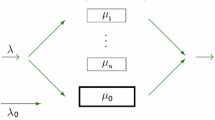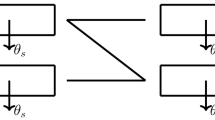Abstract
We study a simple network with two parallel batch-service queues, where service at a queue commences when the batch is full and each queue is served by infinitely many servers. A stream of general arrivals observe the current state of the system on arrival and choose which queue to join to minimize their own expected transit time. We show that for each set of parameter values there exists a unique user equilibrium policy and that it possesses various monotonicity properties. User equilibrium policies for probabilistic routing are also discussed and compared with the state-dependent setting.
Similar content being viewed by others
References
Afimeimonga, H., Solomon, W., Ziedins, I.: The Downs–Thomson paradox: Existence, uniqueness and stability of user equilibria. Queueing Syst. 49, 321–334 (2004)
Afimeimonga, H., Solomon, W., Ziedins, I.: User equilibria for a parallel queueing system with state dependent routing. Queueing Syst. 66, 169–193 (2010)
Altman, E.: Applications of dynamic games in queues. In: Nowak, A.S., Szajowski, K. (eds.) Advances in Dynamic Games: Applications to Economics, Finance, Optimization, and Stochastic Control, pp. 309–342. Springer, Berlin (2005)
Altman, E., Shimkin, N.: individual equilibrium and learning in processor sharing systems. Oper. Res. 46, 776–784 (1998)
Altman, E., Boulogne, T., Ei-Azouzi, R., Jimenez, T., Wynter, L.: A survey on networking games in telecommunications. Comput. Oper. Res. 33, 283–311 (2006)
Bell, C.E., Stidham, S.: Individual versus social optimization in the allocation of customers to alternative serves. Manag. Sci. 29, 831–839 (1983)
Ben-Shahar, I., Orda, A., Shimkin, N.: Dynamic service sharing with heterogeneous preferences. Queueing Syst. 35, 83–103 (2000)
Boxma, O., Koole, G., Liu, Z.: Queueing-theoretic solution methods for models of parallel and distributed systems. CWI/INRIA Tract 105 & 106 (1996)
Braess, D.: Über ein Paradoxon aus der Verkehrsplanung. Unternehmensforschung 12, 258268 (1969)
Braess, D., Nagurney, A., Wakolbinger, T.: On a paradox of traffic planning. Transp. Sci. 39, 446–450 (2005)
Brooms, A.C.: On the Nash equilibria for the FCFS queueing system with load-increasing service rate. Adv. Appl. Probab. 37, 461–481 (2005)
Calvert, B.: The Downs–Thomson effect in a Markov process. Probab. Eng. Inf. Sci. 11, 327–340 (1997)
Calvert, B., Solomon, W., Ziedins, I.: Braess’s paradox in a queueing network with state-dependent routing. J. Appl. Probab. 34, 134–154 (1997)
Chen, Y.Z., Holmes, M., Ziedins, I.: User equilibria for parallel processor sharing networks. In preparation (2010)
Cohen, J.E., Kelly, F.P.: A paradox of congestion in a queueing network. J. Appl. Probab. 27, 730–734 (1990)
Downs, A.: The law of peak-hour expressway congestion. Traffic Q. 16, 393–409 (1962)
El-Taha, M., Stidham, S.: Sample-Path Analysis of Queueing Systems. Kluwer Academic, Dordrecht (1999)
Gelenbe, E., Pujolle, G.: Introduction to Queueing Networks, 2nd edn. Wiley, New York (1998)
Hassin, R., Haviv, M.: To Queue or Not to Queue: Equilibrium Behaviour in Queueing Systems. Kluwer Academic, Dordrecht (2003)
Jia, J.: Optimal routing policies for two batch service queues with partial information. BSc(Hon) Project, Department of Statistics, The University of Auckland (2005)
Koole, G., Sparaggis, P.D., Towsley, I.: Minimizing response times and queue lengths in systems of parallel queues. J. Appl. Probab. 36, 1185–1193 (1999)
Lindvall, T.: Lectures on the Coupling Method. Wiley, New York (1992)
Nash, J.: Equilibrium points in n-person games. Proc. Natl. Acad. Sci. USA 36, 48–49 (1950)
Patriksson, M.: The Traffic Assignment Problem: Models and Methods. VSP, Leiden (1994)
Roughgarden, T., Tardos, E.: How bad is selfish routing? J. ACM 49, 236–259 (2002)
Spicer, S., Ziedins, I.: User-optimal state-dependent routing in parallel tandem queues with loss. J. Appl. Probab. 43, 274–281 (2006)
Stidham, S., Weber, R.: A survey of Markov decision models for control of networks of queues. Queueing Syst. 13, 291–314 (1993)
Thomson, J.M.: Great Cities and Their Traffic. Gollancz, London (1977)
Thorisson, H.: Coupling, Stationarity and Regeneration. Springer, Berlin (2000)
Walrand, J.: An Introduction to Queueing Networks. Prentice Hall, New York (1988)
Wardrop, J.G.: Some theoretical aspects of road traffic research. Proc., Inst. Civ. Eng. 1, 325–378 (1952)
Weber, R.R.: On the optimal assignment of customers to parallel servers. J. Appl. Probab. 15, 406–413 (1978)
Whitt, W.: Deciding which queue to join: Some counterexamples. Oper. Res. 34, 55–62 (1986)
Winston, W.: Optimality of the shortest line discipline. J. Appl. Probab. 14, 181–189 (1977)
Author information
Authors and Affiliations
Corresponding author
Rights and permissions
About this article
Cite this article
Chen, Y., Holmes, M. & Ziedins, I. Monotonicity properties of user equilibrium policies for parallel batch systems. Queueing Syst 70, 81–103 (2012). https://doi.org/10.1007/s11134-011-9264-8
Received:
Revised:
Published:
Issue Date:
DOI: https://doi.org/10.1007/s11134-011-9264-8
Keywords
- User equilibria
- User optimal policies
- Parallel queues
- Dynamic games
- Batch service queues
- State dependent routing




